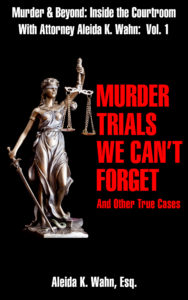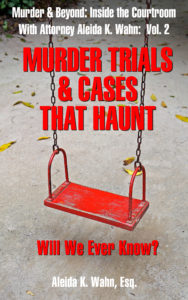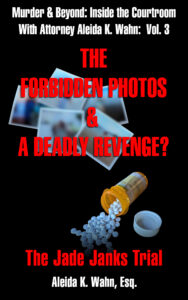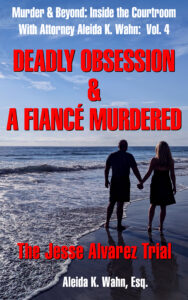
She killed her husband. That is a fact no one disputes, but whether Julie Elizabeth Harper should be found guilty of first degree murder, second degree murder, manslaughter, or whether she acted in justifiable self-defense after enduring years of abuse is the question a jury must now determine. On the morning of August 7, 2012, Julie Harper fatally shot her schoolteacher husband of ten years, Jason Harper, in the master bedroom of their Carlsbad home while their three young children watched cartoons downstairs. Over two years later, Julie Harper’s trial began in the Vista courtroom of Judge Blaine Bowman, with both sides offering vastly different accounts of the killing and of the events that led to such a tragic moment.
Julie Harper Intentionally Killed Her Husband Prosecutor Says
During closing arguments on September 26, 2014, Deputy District Attorney Keith Watanabe argued that Julie Harper was guilty of first degree murder. He said she killed her husband intentionally out of “anger, bitterness and spite,” and the bullet trajectory proved she shot him from behind. Before the shooting she had already checked out of her marriage, forged checks in her husband’s name to obtain large sums of money, and was planning to move on with her life continued Watanabe.
The prosecutor then took the jury back to the year before the killing, to the time of “Julie’s deterioration.” Julie Harper was addicted to narcotic drugs claimed Watanabe, which had been prescribed for her autoimmune disease and rheumatoid arthritis. The police found fifty-two prescription pill bottles in the home on the day of Jason Harper’s death. She became reclusive and slept most of the day while the children were left unattended. She also spent excessively and became a hoarder, with clothes burgeoning out of the closet and clutter piled everywhere. Jason Harper grew angry and the couple argued frequently. The marriage was falling apart and headed for divorce.
Attorney Watanabe told the jury Julie Harper did not act like a person who had killed in self-defense and her actions after the killing showed that she was satisfied with her husband being dead. She was not crying, never called 911, did not try to perform CPR, but instead concealed her husband’s body before embarking on “a day of deceit” to cover up what she had done. While her husband’s body lay on the bedroom floor, Julie Harper took her children to La Costa Coffee, where she purchased pastries and coffee, then tried to arrange playdates for them, took her husband’s cell phone and sent a deceptive message to his family, ditched his car, and hid the murder weapon detailed Watanabe. The gun has never been recovered. Attorney Watanabe said there was evidence that Julie Harper planned to flee as she assembled a “getaway bag” containing $39,000 in cash and passports for her and the children.
The prosecutor dismissed Julie Harper’s claim of physical and sexual abuse, stating Julie Harper was lying. Any abuse was uncorroborated, she did not list rapes in her divorce filing, and never made the claim to her family or friends. Julie Harper was lying about her notations in her day-timer that “sex” was really a code for “rape” stated Watanabe. Julie Harper kept journals in which she documented “every minutia of her life but there is not one single mention of abuse in them,” and when she surrendered to police “she did not have a single bruise on her body” proclaimed Watanabe. Julie Harper was lying and manipulating people he insisted.
Julie Harper Was the Victim of Abuse and Killed In Self Defense
Defense attorney, Paul Pfingst, countered that Julie Harper was indeed an abused spouse, who had endured years of verbal abuse and sexual attacks, including being raped approximately thirty times. He stressed that Julie Harper had no history of violence and only killed her 6’ 7” 230 pound husband while defending herself from another sexual attack during a violent argument after she revealed for the very first time she had filed for divorce. Jason Harper was shot in his left side, not the back said Pfingst. The jury was reminded of the testimony of the children, who were ages six and eight at the time of the shooting, that their mom would lock herself in the bedroom to be safe, and that their dad removed the door knobs so she could no longer lock the door.
Attorney Pfingst said Jason Harper would force Julie to have sex as punishment when he was angry with her and she made notations in her day-timer about these rapes. She sent these documents to her ex-boyfriend, who had remained a good friend, as a way to document the abuse. Attorney Pfingst told the jury Julie Harper had finally worked up her courage and had gone to the courts for help when she filed for divorce five days before the shooting, and described the time when an abused spouse tries to leave a controlling abuser as “the time of risk.”
The jury was then taken to the morning of the shooting when an argument started over Jason’s computer, but escalated out of control when Jason learned about the divorce filing and that he was going to have to pay for his own attorney. Money was always a huge issue to him. Attorney Pfingst detailed how an enraged Jason Harper tore up the bedroom and began another sexual assault. Julie Harper was able to break free and fearing that she would be raped or killed, grabbed the gun and shot him as he came towards her. Julie Harper’s testimony was true argued Pfingst as the couple’s young son testified that his father “looked like he was going to explode,” and that when the children went upstairs to the master bedroom immediately after the shooting, they found their mother in a state of undress.
During the trial, Jason Harper’s abusive nature was placed center stage when the defense played two recordings Julie Harper had secretly taped during arguments. In one video recording, an angry Jason Harper is shown gesturing wildly while yelling at Julie about money and a weekend family vacation he did not want to go on, all the while holding their young son in his arms. The child eventually begins to cry. During the marriage, Jason Harper insisted that Julie contribute $3,000 each month to the household expenses, even when she ceased working, was taking care of the couple’s three children, and was suffering from medical problems. She paid the money from pre-marriage savings, inheritance money, and gifts received from her family, until she eventually told her husband she was unable to do so. Her lack of financial contribution infuriated him. On the video, Jason Harper says, “Don’t force me into going somewhere until you give me my $3,000.”
In another recording, a tape made on the eve of the couple’s tenth wedding anniversary, Jason Harper is heard repeatedly calling his wife a “f****** b****” as they argue over child care issues and money. He tells her that the money he earns as a teacher is his money, and that it will only be their joint money when she contributes. An emotional Julie is heard saying, “I have an abusive husband who calls me names and won’t let me spend any of our money.” When she asks about going out to celebrate their anniversary, he coldly tells her, “I don’t give a sh** about our tenth anniversary. I’ve already said our marriage sucked a**. I’ve already said I’d want a divorce if it was not for our kids. You think I give a sh** about ten years? God, what world do you f****** live in? I am here only for the kids.” Attorney Pfingst described the tapes as “revolting” in his closing summation.
The defense went on to describe Julie Harper’s actions after the shooting as that of a mother who really loved her children and wanted only to protect them from the traumatic circumstances of their father’s death. Attorney Pfingst said that Jason Harper died within seconds and that Julie Harper could not have saved him by doing CPR. Julie Harper was a good mother who was seeking a place of safety for her children before she dealt with the police Pfingst explained. He emphasized that she did not flee and that she told the police from the very beginning that she had shot her husband.
Attorney Pfingst refuted that there was any “getaway bag,” explaining that the bag was packed way in advance of the shooting and was a bag domestic violence victims are instructed to always keep at hand in the event they need to leave immediately. Attorney Pfingst concluded his closing argument by asking the jury whether it was a reasonable interpretation of the evidence that Julie Harper was defending herself and that the gun accidently went off. He asked the jury to make a finding of self-defense and to find Julie Harper not guilty.
The Jury’s Verdict
After two days of deliberation, the jury returned a verdict of not guilty of first degree murder, but deadlocked on the remaining charges. The jury foreman said that their last vote was 9-3 favoring not guilty of second degree murder, 7-5 favoring guilty of voluntary manslaughter, and 7-5 favoring guilty of involuntary manslaughter. Judge Bowman declared a mistrial on these lesser charges and set a court hearing for October 15, 2014, when the District Attorney will announce whether they will seek a retrial. Meanwhile, Julie Harper remains free on a $2 million bond and continues to live in the Carlsbad house the Harper family once called home.
To See Photos of Julie Harper, Jason Harper, and Media Coverage of the Case, Please Go To The Following Link:
About Aleida K. Wahn, Esq.

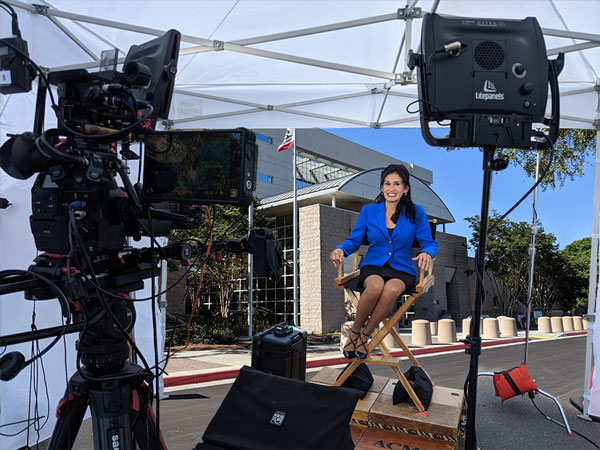
I am an attorney, award-winning true crime writer, and legal analyst of criminal cases. I cover criminal trials and write stories and books about compelling, gripping, and unforgettable cases that impact our world. I take you into the courtroom in high-profile murder trials, rape cases, crimes of passion, cases involving mental illness, deviant behavior, and more. I have a deep passion for true crime, criminal law, and all aspects of the criminal justice system. I have appeared as an expert on true crime shows, including “48 Hours,” “Snapped,” "Peacock TV's Tik Tok Star Murders," and “The Dead Files,” and provided legal analysis on high-profile criminal trials on Court TV, the Law & Crime Trial Network, Fox 5 News, ABC 10 News, and KUSI News. I also create and host shows with the Del Mar Television Producers Group, addressing criminal justice and social issues in recent criminal trials.
I provided my insight and legal analysis on Court TV and the Law & Crime Trial Network of the high-profile trial of former NFL star Kellen Winslow Jr. It was a trial that captured the nation as the heralded ex-football star with fame, fortune, and a famous name stood accused of multiple rapes and other sex crimes involving five women. As the trial delved into shocking facts, complicated legal issues, and unexpected twists and turns, I was there for every minute. After the trial, I wrote a book on the case, going behind the headlines to share the extraordinary details of what happened inside the courtroom. Judging Winslow Jr.: From NFL Star to Serial Rapist? Inside the Shocking Rape Trial of Kellen Boswell Winslow II is now available on Amazon.
I am passionate about telling true crime stories, as these penetrating stories have the power to move us all, while highlighting societal issues which need to be addressed. I have personally seen the human devastation which is present in each trial and believe there is a lesson to be learned in every single case. It is through awareness and examining critical issues society can effect change and even make new laws. To learn more, please visit: https://www.aleidalaw.com.
Read about the gripping and unforgettable trials that I have covered in my latest books:


